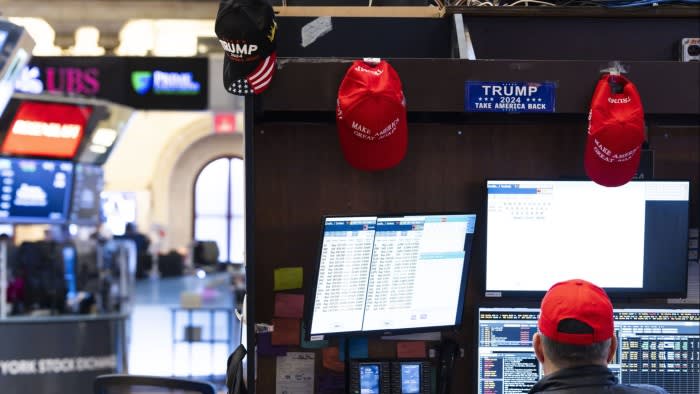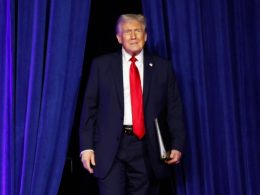US stocks and other risky assets rallied on Wednesday after Donald Trump’s decisive election victory, but bond investors highlighted why euphoria could be shortlived if the president-elect’s campaign policies drive up inflation.
“Sugar rush is a good term for what we’ve experienced,” said Tina Fordham, founder of advisory firm Fordham Global Foresight, which advises investors and corporate executives on political issues. While the Republican victory was good for equities, she said “we are not in the same economic environment that we were in 2016, and Trump’s policies are inflationary. I think it does eventually intersect with expectations about the Fed rate cutting cycle, and geopolitical risks.”
The S&P 500 and Nasdaq Composite both set new record highs on Wednesday, jumping 2.5 per cent and 3 per cent, respectively.
Investors are always wary of reading too much into early moves after presidential elections, and many warned about the risk of “head-fakes” in the run-up to the vote. However, several analysts and investors said the tension between different parts of Trump’s policy platform added to the risks of a reversal.
Economists have warned that several of Trump’s proposed policies, including corporate tax cuts, sweeping tariffs and the deportation of millions of immigrants could cause a resurgence in inflation just as the Federal Reserve had grown confident that it had brought price rises under control.
Futures market pricing on Wednesday indicated investors were still expecting the Fed to announce a quarter-point rate cut on Thursday, but they have scaled back their expectations for rate reductions over the next 12 months.
“You can simultaneously believe that a corporate tax cut noticeably increases the value of equities,” said David Kelly, chief global strategist at JPMorgan Asset Management, “but at the same time that tax cut could increase deficits . . . and long-term interest rates.”
The Russell 2000 index of small-cap companies rose even further than the S&P, leaping 5.8 per cent to its highest level since 2021. The advance reflects a belief that small companies, which tend to be more focused on their domestic market, have more to gain from tax cuts and less to lose from a trade war. The Russell 2000 is also heavily weighted towards financial stocks, which investors are hoping will benefit from looser regulation and an increase in dealmaking.
However, it could also be on the frontline of any reversal in sentiment. The most important driver of the Russell for most of this year has been interest rate expectations, and a return to inflation and higher-for-longer rates could lead to a sharp reversal.
“We’re having an outsized reaction right now,” said Invesco’s chief global market strategist, Kristina Hooper. “A decisive win was a surprise given the polling, but I think there will be at least some modest reversal . . . as we hear more and more from the president-elect.”
Although equity investors on Wednesday were mainly focused on the positive side of the equation, there were already some pockets of activity pointing towards longer-term worries. The worst-performing sector in the S&P 500 was real estate, a sector where returns are highly correlated with interest rates. Utilities, another rate-sensitive sector, also slid.
Concerns were more pronounced in government bond markets. By late afternoon on Wednesday, the benchmark 10-year Treasury yield was up 0.15 percentage points to 4.44 per cent — its highest level since July — while the longer-dated 30-year yield climbed 0.17 percentage points to 4.62 per cent, reflecting a steep decline in price.
Bondholders and strategists said the sharp moves in Treasury yields reflected expectations of an inflationary environment during Trump’s presidency that could deter the Fed from rapidly easing monetary policy, after the central bank cut rates in September for the first time since 2020.
Invesco’s Hooper said: “I think we are getting much closer to the potential for ‘bond vigilantism’.” This is when bond investors try to force governments to change policy by driving up their borrowing costs. “A showdown could certainly be hastened because of this election.”
Still, Robert Tipp, head of global bonds at PGIM Fixed Income, stressed that the vast scale of the US economy and its bond market made it much less vulnerable to the sort of volatility that rocked the UK when former prime minister Liz Truss attempted to radically increase borrowing in 2022.
“I think we’re in a market where there are still more buyers than issuers,” he said.
Investors also emphasised that while the results of Tuesday’s presidential election were decisive, and the Republicans had gained control of the Senate, there was less clarity over who would control the House of Representatives, which could affect Trump’s power to implement more radical proposals.
Bond investors “will be paying a lot of attention” to the final balance of power in Congress, said Dec Mullarkey, managing director at SLC Management. “Rates are by far the most responsible asset class in paying attention to the deficit.”
If bond yields continue to rise, investors predicted that equity investors would not be able to shrug it off forever.
“In general we’re staying with a pro-risk posture,” said Matt Peron, global head of solutions at Janus Henderson, the $380bn asset manager.
“Earnings are definitely picking back up . . . [and] you can take off some tail risk” due to the decisive result. But, he added: “The deficit issue and the interest rates issue will be something the equity markets have to contend with. I don’t think they can just ignore that.”
Source link









